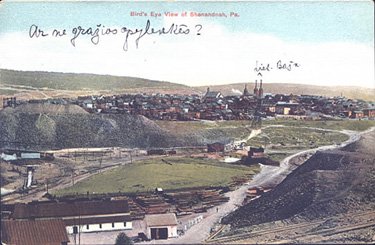“We Took Our DNA, and Left Town”
Anthracite Region, DNA, Determinism, Pennsylvania, Scientism, Shenandoah, Social Mobility

A view of my hometown, Shenandoah, Pennsylvania, from the southwest, in the vicinity of the West Shenandoah Colliery, overlooking the culm banks, circa 1910. The writing says in Lithuanian: “Ar ne grazios apylenkis?” (sarcastically) “Are not the surroundings beautiful?” The location of the Lithuanian church is also marked by hand.
The Economist quotes a British DNA study contending that it wasn’t brains or character or superior family culture that caused the lucky ones who got out to leave. No, it was deterministic genes.
To establish baselines for their work, Dr Abdellaoui, Dr Visscher and their colleagues turned first to 33 published studies that used a technique called genome-wide association study. This is intended to discern the contributions to a trait of large numbers of genetic differences that each have a small effect. It concentrates on so-called single-nucleotide polymorphisms (SNPs)—places in the DNA where an individual genetic “letter†routinely varies from person to person. There are, for example, about 100,000 SNPs that affect height. On average, each makes a contribution, either positive or negative, of 0.14mm to someone’s adult stature. This is in contrast to Mendelian variations, where a single difference between individuals has a pronounced effect—such as the difference between brown and blue eyes.
Each of the 33 baseline studies identified large numbers of SNPs that had positive or negative effects on a particular trait: extroversion, heart disease, height, body fat, age at menopause, recreational drug use and so on. The researchers then applied these SNP patterns to the records of 450,000 UK Biobank participants, and asked various questions. One thing they looked for was geographical clustering of SNPS related to individual traits. This, they discovered in abundance. Of the 33 traits under consideration, 21 showed evidence of SNP-related geographical clustering.
The most strongly clustered of all, they found were SNPS for educational attainment (ie, how many years an individual had spent at school and college). SNPs lowering educational attainment were particularly clustered in former coal-mining areas. These are places that have seen a lot of internal migration, both inward, when the mines were developed during the late 18th and 19th centuries, and outward, after the second world war, as mining shrank from being one of Britain’s biggest employers to its current state of near non-existence.
Dr Abdellaoui and Dr Visscher were able, from their studies of the biobank’s records, to chart the effects of the more recent, outward migration. They divided participants into four groups: those born in mining areas who had subsequently left; those born in mining areas who had stayed; those born outside mining areas who had moved into one; and those who had never lived in a mining area. The results were stark. People in the first group, outward migrants from mining areas, had significantly more educational-attainment-promoting SNPS, and fewer damaging ones, than any of the other groups, while people in the second group, stay-at-homes in mining areas, had the opposite.
Though not quite so sharply as with educational achievement, this pattern was also reflected in all but one of the other 20 SNP-related traits the researchers looked at. With the exception of bipolar disorder, the best outcomes were found in outward migrants from coalfields and the worst in stay-at-homes. The healthy, in other words, depart. The less healthy remain.
The upshot is a vicious spiral. That young, ambitious, healthy people tend to leave economically deprived areas is hardly news. But to see that written clearly in their DNA, which they take with them when they leave, while the converse is written in the DNA of those who stay behind, raises questions of nature and nurture that society is ill-equipped to answer, and possibly unwilling to confront.



